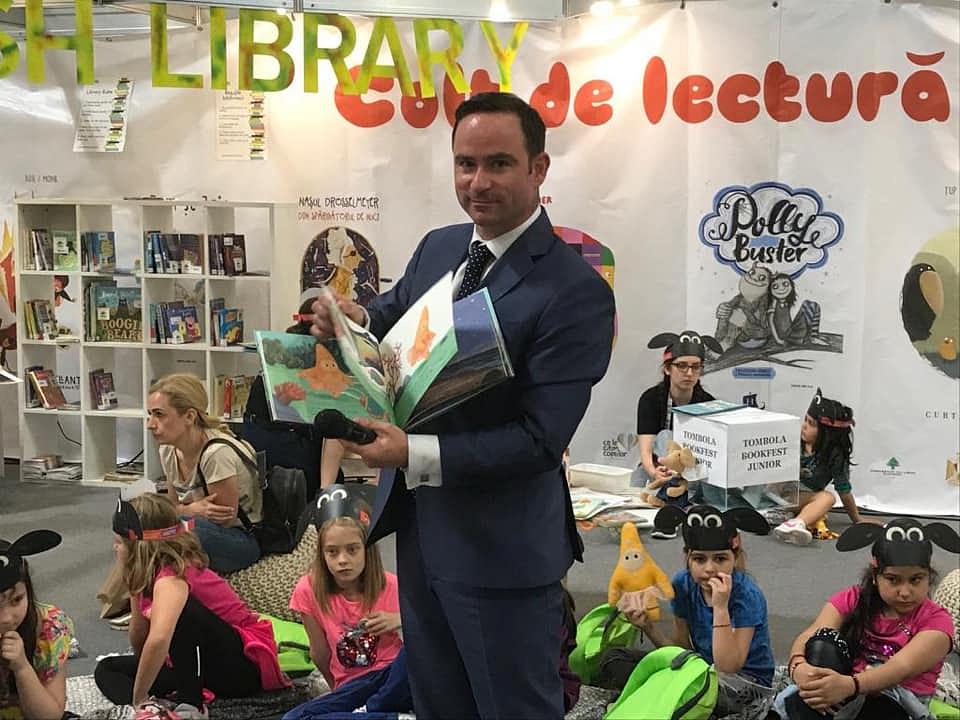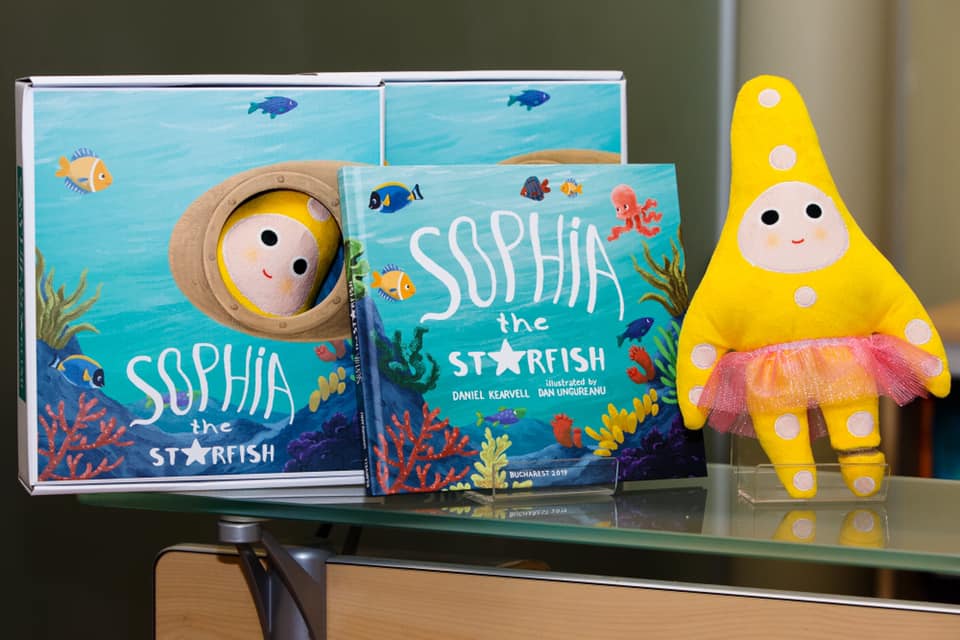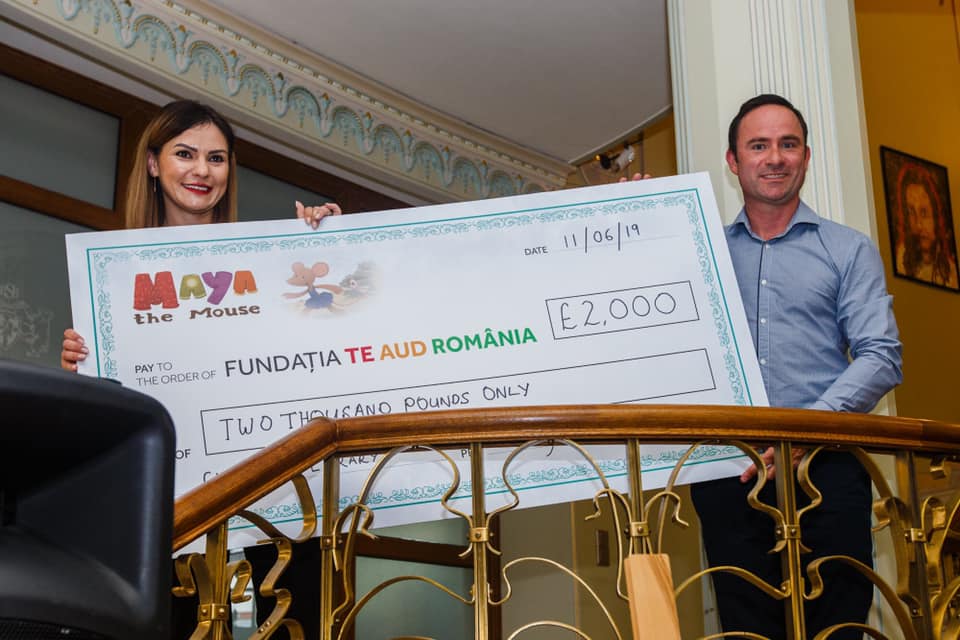A different delivery: Children’s books by expat executive celebrate diversity, support charity project in Romania



A lover of literature, Kearvell had always enjoyed writing but the project of the first children’s book came about by chance, after penning a story for his eldest daughter, Maya. Help from friends saw the story illustrated, printed and ready to meet its audience. As the second book is released, Kearvell tells Romania-Insider.com about the new addition to the series, how he views writing, and what are some of the titles on his reading list.
Sophia the Starfish was inspired by your daughter Sophia. What do the two (fictional character and real-life person) have in common?
Yes, it is true that Sophia (the Starfish) was indeed inspired by Sophia (my daughter)! Their most common characteristics are that they are both happy and fun-loving. Both share a desire to make friends, engage with their communities, and generally be sociable and outgoing. I would also say that they share the common characteristic that neither of them are shy at coming forward, as we say!
Besides your family, where do you get the inspiration for your stories? What are some of the important aspects in developing them?
The inspiration for my stories comes, I think, partly through having been an avid reader as a child myself, in particular, and also enjoying reading with my children. I am keen for my books to firstly be enjoyable to read and experience, for them to encourage children to want to read more, and at the same time they have the common theme of diversity, and difference, as strength.
Your two books focus on characters that are a bit different and manage to overcome adversity. What drew you to this topic?
I think the experience of living and working in many different countries and communities has taught me that tolerance of difference is perhaps one of the key personality traits we should try to develop in our children, and it is a principle that I believe in strongly. We should be respectful of difference, and tolerant of those less able or that are disadvantaged in some way.
How did the experience of presenting Maya the Mouse go with the children? Was it what you expected? What were some of the reactions you received from children? What was the feedback from your daughters?
Given that it was my first children’s book, I had no idea what reception the book would receive. However, I soon discovered that children’s feedback is always the most valuable, because it is totally unfiltered! This is also true of the direct feedback that I believe from my own daughters, who – I think I can confidently say – are proud of the books. Certainly, the fact that a year went past after Maya’s release, before the publication of Sophia, caused some anguish to the real Sophia, who was quite impatient for “her” book to come out! My readings went very well, and the children seemed to relate to the stories, enjoyed the wonderful illustrations and definitely actively participated in the subsequent discussion on some of the book’s major themes.
There are five other characters/stories in planning (Isabella the Iguana/ Megan the Monkey/ Caitie the Crab/ Annabelle the Anteater/ Isla the Ibis). Can you tell us anything about them?
Yes, they all already have characters and adventures planned – in my head, at least! I have two daughters and five nieces – a generation entirely free of the male influence. It is my ambition to dedicate a Story Out Of The Box to each of them….although I should say that for the time being it is one step – and box! – at a time….
Between your job and other daily pursuits, when do you find time to write? What is your writing process?
Well, given that Stories Out Of The Box is entirely a hobby done in my spare time (of which I do not have too much in any case) – I cannot pretend to claim that I have a particular process that I follow! The actual writing of both my books was done relatively quickly, in perhaps a couple of days (in Sophia’s case, on the beach during my last holiday) – but putting together the illustrations, books, printing and production of the toys is of course quite time-consuming. I prefer to write in a totally isolated location, free of other distractions. Three such locations which come to mind are: the beach, the library or an airplane – the latter of which being a particular productive setting for work and creativity, for some reason!
How does the business role go with the writer’s one? How do you transition between the two?
I believe that anyone, regardless of profession and role, should maintain interests outside of their professional activity. For me, it helps maintain my balance and perspective, and keeps my literary side active - a side of me that I always enjoyed developing. I find writing relaxing, and it helps me switch off, helping with the transition between office and home.

What books are you reading now? What does your reading list of this year look like?
My reading list is very diverse, and probably quite eclectic: at the moment I enjoy reading Romania-themed books such as “To Romania with Love” by Tessa Dunlop. Together with my daughter, we are working through “Wonder”, the amazing bestseller by R.C.Palacio. Speaking of variety, in recent weeks and months, I have read “Sevens Heaven”, about the Fiji Rugby 7s team, a book on Romanian post-1989 history, “Stalin’s Englishman”, about the English spy Guy Burgess, and various George Orwell reviews. I have always been a huge Orwell fan and held a small seminar in Bucharest on his work last year.
Have you read any Romanian authors? Do you have some titles you enjoyed?
I cannot say that I am particularly well read in the sense of Romanian authors, although this is something I wish to address this summer, having ordered various works – hard copies, not Kindle! – by Mircea Eliade and Ion Luca Caragiale already in this respect! My major “foreign” literary influence has always been Russian: particularly Chekhov, Gorky, Turgenev, and Dostoevsky.
What would you say are the most important aspects to follow in writing for children?
Try to put yourself inside their heads! Pitching the language at the right level is also crucial, as is I think a sense of fun, adventure, and in general escapism. Books are an escape into another world, and you have to make this world as vivid and easily imaginable as possible; at this, this is my aim – I am not sure whether I achieve it!
What do you think are some of the best ways to keep children interested in reading when there are so many digital distractions around?
This is not an easy task, as can be evidenced by how often children are given phones to play with in public and social occasions. My personal view on this is that there is no easy approach: books take effort and require a significant time investment, versus the instant gratification of the tablet or phone. The digital world for children, it should be stressed, is a wonderful one, and should be utilized in a safe, healthy and balanced manner. If parents themselves show an interest in reading, provide frequent opportunities to do so, together with their children – at bedtimes or at weekends – then I believe there is more chance that the child will learn to value and enjoy the reading experience.

I am proud to be a mentor on the community development programme that Te Aud coordinates, together with my company, DHL Express, and other wonderful partners. It has been a rewarding and humbling experience, both in terms of witnessing the development of the children, the opportunities the initiative has given them – and for the third year in a row, the increase in numbers of children that we have been able to accept onto the programme.
You have been living in Romania for some time now. Do you have some favorite places or experiences here? How do you think Romania has changed since you first arrived?
I am often asked these questions. Romania is, without doubt, a beautiful place, but I find it hard to compare locations that are just so different – as a family, we enjoy Bucharest equally as much as we enjoy the diverse experiences of Brasov, the Carpathians, Cluj or Bucovina, not to mention Sibiu and the Delta. I have been fortunate to have had the opportunity to travel the country widely, and this has greatly enriched my experience, and that of my family. One of the fascinating things about Romania is that it is always, in my opinion, changing, evolving, challenging and moving forward in equal measure. Whilst it remains a dynamic environment, I believe even more than ever that Romania is still a land full of opportunity.
The Stories out of the Box books can be ordered here. Each project is both book and toy pack. Profits from the Maya and Sophia packs are donated to Te Aud charity.
(Photos: Storiesoutofthebox Facebook Page)